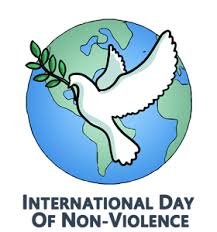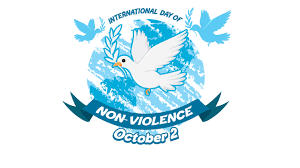International Day of Non-Violence 2024: A Global Call for Peace
Introduction to the Day
The International Day of Non-Violence is observed annually on October 2nd, coinciding with the birth anniversary of Mahatma Gandhi, a pivotal figure in promoting the philosophy of non-violence and peace. In 2024, this day serves as a reminder of the power of non-violence as a tool for social change and harmony in a world often marked by conflict and aggression.
The Theme for 2024
This year, the theme for the International Day of Non-Violence is “Cultivating Peaceful Societies,” focusing on the importance of building communities rooted in respect, dialogue, and understanding. The United Nations, which established this day in 2007, encourages individuals, organizations, and governments worldwide to foster an environment where non-violence is prioritized in personal and societal interactions.
Significance of Non-Violence in Today’s World
In a world facing numerous challenges, including political unrest, social inequality, and climate change, the principles of non-violence have never been more relevant. Non-violence is not just the absence of violence but also involves proactive measures to address injustice and promote peace. The day encourages educational programs that promote non-violent conflict resolution and the importance of compassion in daily interactions.
Global Observance and Activities
Countries around the globe observe the International Day of Non-Violence with various activities, including seminars, workshops, and community service projects. Schools often incorporate lessons about Gandhi’s teachings and the importance of non-violence in history and contemporary society. This collective observance not only honors Gandhi’s legacy but also instills the values of empathy and respect among future generations.
Conclusion
As the world reflects on the significance of non-violence, it is essential to understand its role in shaping peaceful societies. The International Day of Non-Violence serves as a platform to reiterate the commitment to peaceful resolutions and the cultivation of an inclusive environment for all.

Why This News is Important
A Reminder of Gandhi’s Legacy
The International Day of Non-Violence not only commemorates the life and teachings of Mahatma Gandhi but also reinforces the relevance of his philosophy in today’s tumultuous world. As future leaders, students must grasp the significance of non-violent principles in fostering societal change and building a better future.
Promoting Peaceful Societies
In an era where conflicts often overshadow peaceful resolutions, this day promotes discussions and initiatives that emphasize dialogue over aggression. Understanding and advocating for non-violence is crucial for students preparing for various government positions, including civil services, where conflict resolution plays a vital role.
Educational Initiatives
The observance encourages educational institutions to incorporate non-violence themes into their curricula. This aligns with the need for future leaders to possess skills in conflict resolution, diplomacy, and community engagement. Students must recognize the role of education in nurturing a culture of peace.
Global Cooperation
The International Day of Non-Violence also underscores the importance of global cooperation in addressing challenges such as terrorism, discrimination, and environmental degradation. Students preparing for government roles should understand the need for collaborative efforts to create sustainable solutions.
Inspiring Action
This day serves as a catalyst for individuals and organizations to engage in actions that promote non-violence in their communities. Students can take inspiration from various initiatives, understanding that their involvement can lead to significant changes in society.
Historical Context
The Origins of the Day
The International Day of Non-Violence was established by the United Nations in 2007, recognizing the importance of non-violence in achieving global peace. It is observed on October 2nd to honor the birth anniversary of Mahatma Gandhi, who led India’s struggle for independence through non-violent means. Gandhi’s philosophy influenced numerous civil rights movements worldwide, showcasing the power of peaceful protest and civil disobedience.
Gandhi’s Influence
Mahatma Gandhi, known as the “Father of the Nation” in India, advocated for non-violence (Ahimsa) as a way to achieve social and political goals. His methods inspired leaders like Martin Luther King Jr. and Nelson Mandela, who used non-violent strategies to fight for civil rights and social justice. The observance of this day aims to educate future generations about the effectiveness of non-violence in addressing injustices and conflicts.
Key Takeaways from International Day of Non-Violence
| Serial Number | Key Takeaway |
|---|---|
| 1 | Observed on October 2nd, coinciding with Gandhi’s birth anniversary. |
| 2 | The 2024 theme is “Cultivating Peaceful Societies.” |
| 3 | Encourages educational programs promoting non-violent conflict resolution. |
| 4 | Global observance includes seminars and workshops on non-violence. |
| 5 | Highlights the importance of empathy and respect in society. |
Important FAQs for Students from this News
What is the International Day of Non-Violence?
The International Day of Non-Violence is observed on October 2nd to commemorate the birth anniversary of Mahatma Gandhi and promote the global message of non-violence as a means of achieving peace and resolving conflicts.
Why is the International Day of Non-Violence celebrated on October 2nd?
The day is observed on October 2nd because it marks the birth anniversary of Mahatma Gandhi, who is widely recognized as a global advocate of non-violence and peaceful resistance.
What is the theme of the International Day of Non-Violence 2024?
The theme for 2024 is “Cultivating Peaceful Societies,” focusing on promoting peaceful resolutions, dialogue, and understanding across societies.
Who established the International Day of Non-Violence?
The United Nations General Assembly established the International Day of Non-Violence in 2007 to promote the importance of non-violent conflict resolution worldwide.
How is the International Day of Non-Violence observed globally?
The day is observed with activities such as seminars, workshops, educational programs, and community events that promote the principles of non-violence and peaceful conflict resolution.
Some Important Current Affairs Links













